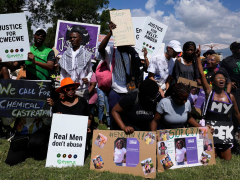On May 25, Olorato Mongale, a 30-year-old woman from South Africa, went on a date with a man she had recently met.
Less than two hours later, she was dead.
Her half-naked body was found by the roadside in Lombardy West, a suburb north of Johannesburg. It showed signs of severe trauma and bruising. Investigators concluded that she had been murdered elsewhere and dumped at the scene.
Her brutal and senseless killing led to a wave of grief and outrage on social media. Days later, a family spokesperson revealed that Mongale – a master’s student at the University of the Witwatersrand – had once worked as a journalist. She left the profession seven years ago due to the emotional toll of reporting on gender-based violence and femicide (GBVF).
Her family said Mongale had grown increasingly anxious about her own vulnerability to male violence. In particular, the 2017 murder of 22-year-old Karabo Mokoena haunted her. Mokoena was stabbed to death by her ex-boyfriend, Sandile Mantsoe, who then burned her body beyond recognition and buried the remains in open grassland in Lyndhurst – a suburb just kilometres from where Mongale’s body was found.
Despite her conscious efforts to avoid Mokoena’s fate, Mongale ultimately became what she had feared most: another name added to the long and growing list of South African women murdered by men.
At her funeral on June 1, her mother, Keabetswe Mongale, said her daughter had tried desperately to fight off her attacker.
“When I saw her at the government mortuary, I could see that my daughter fought. She fought until her nails broke,” she said.
Her devastating death serves as a stark reminder that women and girls across South Africa continue to face an existential threat from gender-based violence, despite years of government promises and reforms.
On May 24, 2024, President Cyril Ramaphosa signed into law a bill establishing the National Council on Gender-Based Violence and Femicide. The body is mandated to provide leadership and coordination in the fight against GBVF. While it appeared to be a step forward, it did not represent a transformative policy shift.
This is not the first such initiative. In 2012, then-Deputy President Kgalema Motlanthe launched the National Council Against Gender-Based Violence, with a similar mandate to coordinate national anti-GBV efforts.
More than a decade later, with yet another council in place, GBVF crimes continue.
In November 2023, the Human Sciences Research Council (HSRC) of South Africa released the country’s first national study on GBVF. It found that the persistence of gender-based violence is rooted in “deeply ingrained societal norms and structures that perpetuate male dominance and reinforce gender hierarchies … leading to female subordination, systemic inequalities, and violence against women”.
The destructive effect of entrenched patriarchy is undeniable. In South Africa, a woman is murdered every three hours. That is approximately 8 women a day. One study estimates that around 7.8 million women in the country have experienced physical or sexual violence.
While women of all races and backgrounds are affected, Black women face higher rates of GBVF – an enduring legacy of apartheid and its structural inequalities.
This c





